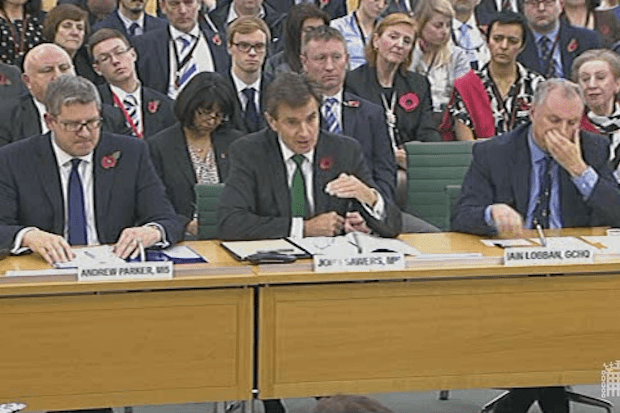The nation was agog today as Britain’s spymasters were summoned to parliament. The heads of MI5 and MI6, along with the boss of GCHQ, were grilled about the ethics and practice of counter-terrorism. It was a 2 pm kick-off but the session got underway at 2.02 pm in real time. A tag on the TV feed said, ‘Two minute delay’. The idea was to prevent the masters of international espionage from blurting out vital secrets on live television. Theatrical nonsense, of course. But it added a frisson of Cold War glamour to proceedings. And it gave a lift to the ratings which were already enjoying a welcome boost thanks to the thousands of Al Q’aeda suicidalists tuning in from failed states across the middle-east. Many of these Islamists haven’t even paid their TV licences.
The top spies didn’t look like spies. They were more like politicians in their crisp suits and November poppies. But then they’re supposed to blend in. Andrew Parker, head of MI6, could be the chair of the London Labour party. He has a big brainy head, and square adman’s glasses and he’s full of strategic thoughts and smart phrases. On his far side sat Iain Lobban (GCHQ) who has a pink, narrow skull and quick, anxious eyes. He’s clearly not used to public appearances. A chief whip.
And in between these two sat the well-coiffed splendour of John Sawers. The multi-lingual boss of MI6, with his JFK looks and silvery tongue – he talked a lot and said very little – could easily serve as Foreign Secretary. Failing that, he wouldn’t do badly in charge of Debenhams.
The inquisition was led by committee chairman Malcolm Rifkind, escorted by Ming Campbell, Robin Butler, and a few other defunct warships. The spies in disguise quickly greased up to the grandees. Titles were flying around like plates at a Greek wedding. Yes, Sir Ming. No, Lord Butler. Absolutely, Sir Malcolm. John Sawers told Lord Butler that his report on WMD in Iraq was treated ‘like the bible’ by the intelligence services. Flattery like this made the seminar sound rather stagey.
As did some of the answers.
We were assured that a rogue geek, like Edward Snowden, couldn’t run off with a shedload of British secrets because there are ‘tight access arrangements’ and ‘vetting to the highest level.’
Iain Lobban claimed that GCHQ had no interest in personal emails or phone calls. If asked to snoop on private communications, he said, his staff would walk out.
Andrew Parker was asked if the security services were ‘beyond reproach’ and would never be complicit in torture overseas. His long fluent, answer ended in a single word. ‘Yes.’ This promise is too large, and too fulsome, to be credible.
On the terrorist threat in Northern Ireland, he sounded as suave and certain as a Buddhist healer. ‘It won’t last forever,’ he purred. ‘Over time, these people will either give up or face the courts and be put in jail.’ He added, ‘Eventually we will see a Northern Ireland without terrorism.’ Easy as that.
He insisted that liberty lay at the heart of the spying game. ‘Our raison d’etre is to protect a free society.’ A previous government had offered to extend the spooks’ powers. But the service had said no. A hint of tetchiness entered Parker’s voice when he was asked about public accountability. He’d already done four stints in front of the committee, he said, and he’d bunged them a truck full documents as well. Fair point.
A bit less time fielding questions from Sir Ming, please, and a bit more time steaming open Anjem Choudary’s fan mail. Then we’ll all sleep safer.







Comments